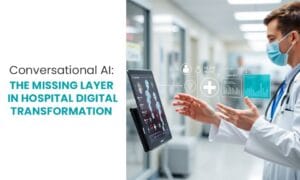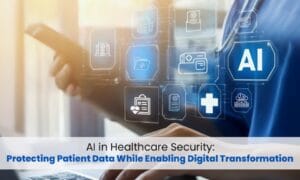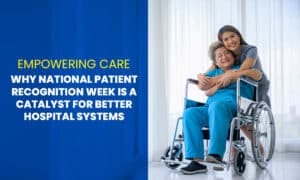The healthcare industry is undergoing a monumental shift driven by data, technology, and connectivity. Hospital leaders today understand that technology is no longer a support function—it is the core engine of operational excellence and patient care. Among the future trends in healthcare technology for hospitals, one stands out as the defining factor: interoperability.
Healthcare interoperability allows different systems—electronic health records, lab databases, pharmacy management software, and diagnostic tools—to communicate effortlessly. For hospitals, this shift from isolated IT systems to connected networks is more than a technology upgrade—it’s a strategic move toward efficiency, safety, and better clinical outcomes.
Understanding HMS Interoperability in the Modern Hospital Ecosystem
Hospital Management Systems (HMS) serve as the digital backbone of healthcare organisations. However, without interoperability, they become data silos that limit the flow of vital patient information. HMS interoperability enables hospitals to share and access accurate data across departments and external care networks in real time—a core aspect of the future trends in healthcare technology for hospitals.
Through standardised frameworks such as FHIR and HL7, hospitals achieve seamless data sharing and ensure that patient information travels securely across platforms. These standards form the foundation for connected care solutions, allowing healthcare professionals to collaborate more effectively.
Interoperability is no longer an operational upgrade—it is the foundation of digital transformation in healthcare IT. Hospitals that invest in interoperable systems position themselves at the forefront of innovation, care quality, and organisational agility.
How Hospital Management Systems Integrate with Other Healthcare Systems
The ability of hospital management systems to integrate with external systems defines the next generation of healthcare technology. Successful hospital management system integration ensures that every data source—from diagnostic imaging to pharmacy inventory—is connected within a single ecosystem, reinforcing the future trends in healthcare technology for hospitals.
Integration begins with open APIs that facilitate communication between different systems. When an HMS connects with Electronic Health Records (EHRs), Radiology Information Systems (RIS), Laboratory Information Systems (LIS), and billing software, it ensures a continuous and unified data flow. This interconnected structure enhances patient safety, reduces manual errors, and provides clinicians with a holistic view of patient history. A fully integrated HMS doesn’t just simplify operations—it drives connected care solutions for hospitals by aligning all touchpoints of the care delivery process.
Also Read – EMR Software – Ezovion
Achieving Interoperability in Hospital IT Infrastructure
Reaching full interoperability requires a well-planned transformation strategy. Most hospitals face health data interoperability challenges due to legacy systems, incompatible software, and inconsistent data formats. Overcoming these barriers demands a structured roadmap aligned with the future trends in healthcare technology for hospitals.
Key steps include:
- Evaluating existing systems to identify integration gaps.
- Adopting open standards like FHIR and HL7 for data compatibility.
- Deploying APIs and middleware for cross-platform communication.
- Strengthening governance and compliance to maintain data security.
- Training healthcare IT teams to manage interoperability frameworks effectively.
This systematic approach builds the foundation for HMS interoperability and ensures that hospitals can scale their technology infrastructure as they grow. Interoperability is not just a technical capability—it’s a culture of collaboration and transparency embedded into hospital operations.
Benefits of an Interoperable HMS for Care Coordination
An interoperable HMS delivers measurable benefits across all dimensions of hospital operations. Improved data accuracy allows clinicians to make better informed decisions. Real-time access to patient information enhances diagnosis speed and treatment effectiveness.
From a business perspective, interoperability significantly reduces operational redundancies, minimises paperwork, and optimises staff productivity. It enables administrators to track performance metrics more effectively and align resources with patient needs.
For patients, this translates into a seamless care experience where every provider, specialist, and support service has access to the same data. In the landscape of future trends in healthcare technology for hospitals, this collaborative model of care coordination stands as one of the most impactful.
Also Read – Dashboard to Decisions: Building Trustworthy AI Decision – Support Tools For Hospital Leaders – Ezovion.

Steps to Connect Your HMS to Labs, Pharmacies, and External Systems
Building a truly interoperable ecosystem requires hospitals to look beyond internal processes and connect with external healthcare stakeholders. Integrating your HMS with laboratories, pharmacies, diagnostic centres, and partner networks enhances operational efficiency and enables seamless, coordinated care across the continuum.
Step 1: Establish Standardised Data Interfaces
The first step in achieving interoperability is implementing standardised data interfaces that enable smooth data exchange. Using FHIR-based APIs ensures that your HMS can communicate with external systems—such as labs and pharmacies—without data distortion or compatibility issues. These standardised interfaces eliminate fragmentation, promote consistency, and ensure that all data exchanged is accurate, complete, and ready for clinical decision-making.
Step 2: Enable Real-Time Data Exchange
Hospitals must move from periodic batch updates to continuous, real-time connectivity across systems. This ensures that lab results, prescriptions, and imaging data flow directly into the HMS the moment they are available, allowing physicians to act faster. With immediate access to accurate patient data, care teams can make time-sensitive treatment decisions, reduce delays, and improve overall clinical outcomes through faster information turnaround.
Step 3: Prioritise Security and Compliance
Interoperability cannot come at the cost of data security. Every connection between your HMS and external systems must be protected using advanced encryption, access controls, and audit trails. Implementing strict compliance with HIPAA, GDPR, and other regional data regulations ensures patient information remains confidential and tamper-proof. A secure interoperability model builds trust among healthcare partners and safeguards your organisation from costly data breaches.
Step 4: Build Scalable Integration Models
Hospitals should design integration frameworks that evolve alongside emerging healthcare technologies. A scalable HMS integration model ensures compatibility with telehealth platforms, diagnostic devices, and new digital health applications as they enter the market. This future-ready approach not only supports innovation but also guarantees that your hospital remains agile, adaptable, and competitive—a key aspect of the future trends in healthcare technology for hospitals.
Best Practices for HMS Interoperability in Multi-Facility Networks
As healthcare organisations expand across multiple locations, interoperability becomes essential for consistency and scalability. In a multi-facility environment, HMS interoperability ensures that data is synchronised across all units, enabling unified management and decision-making.
Best practices include:
• Implement a Master Patient Index (MPI): Use a centralised MPI system to eliminate duplicate records and maintain accurate, consistent patient identities across facilities. This ensures every care provider, regardless of location, accesses the same verified patient data in real time.
• Adopt Cloud-Based Infrastructure: Leverage cloud technology to streamline integration, enhance system flexibility, and support real-time data access from any hospital unit. Cloud platforms also simplify updates and scalability, ensuring your HMS grows with organisational expansion.
• Centralise Data Governance: Develop a unified governance model that standardises privacy protocols, regulatory compliance, and data stewardship across the network. This strengthens accountability and minimises inconsistencies in data management practices.
• Monitor Integration Performance: Continuously track integration metrics such as uptime, latency, and data accuracy to maintain optimal interoperability performance. Regular audits and analytics-based reporting help IT teams identify issues early and ensure system reliability.
Also Read – HIMS Software for Practice Management: Effective & Enhanced – Ezovion
Future Trends in Healthcare Technology for Hospitals
The future trends in healthcare technology for hospitals revolve around the convergence of interoperability, analytics, and automation. Artificial intelligence and predictive analytics are transforming how hospitals interpret and act upon health data.
Interoperable HMS platforms powered by AI can identify at-risk patients, automate administrative workflows, and predict demand for specific treatments. Additionally, the Internet of Things (IoT) is connecting wearable devices and remote monitors directly to hospital databases, ensuring that care extends beyond traditional settings.
Blockchain technology is also emerging as a secure and transparent way to exchange patient data, minimising the risk of breaches while maintaining traceability. Together, these innovations are driving the next era of digital transformation in healthcare IT, where interoperability is not just an advantage—it’s a necessity for survival.

Overcoming Health Data Interoperability Challenges and Security Risks
Despite its benefits, interoperability introduces challenges that hospitals must address proactively. Data fragmentation, system incompatibility, and security vulnerabilities are among the most common health data interoperability challenges.
Hospitals must implement robust data governance models, ensuring that every integration complies with HIPAA, GDPR, and other regional data protection regulations. Encryption, identity management, and zero-trust frameworks play a critical role in safeguarding sensitive information.
By addressing these issues head-on and aligning with the future trends in healthcare technology for hospitals, hospitals can build resilient, secure, and compliant systems that support innovation without compromising patient privacy.
Building the Interoperable Hospital of Tomorrow
The future trends in healthcare technology for hospitals clearly point toward a world where interoperability defines success. Hospitals that prioritise integration, collaboration, and real-time data exchange will lead the way in clinical innovation and patient outcomes.
Investing in HMS interoperability today is an investment in future readiness. As the healthcare ecosystem continues to evolve, hospitals that embrace interoperable IT frameworks will transform into agile, data-driven organisations that deliver superior care and sustainable growth.
Interoperability is not just a technological upgrade—it is the cornerstone of healthcare innovation and the future of hospital IT.





